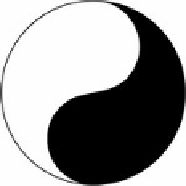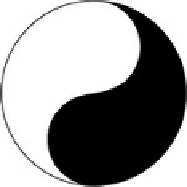Information Technology Reference
In-Depth Information
reference frame exists in everyone's hidden consciousness, and everyone can realize
the genius to see the ultimate truth in the ultimate world (e.g., the Pure Land).
This expression carries the means of knowledge
K
in broad sense, or the identity in
different scenarios.
With extenics one can turn incompatible knowledge into resoluble. In Chinese
idiom “Prince Caochong weighing elephant” where the goal and condition are
incompatible at ancient time, he reaches the wisdom by changing the equilibrium in
the identity process (as weighing equal weight of rocks on a boat):
weighing elephant = measuring weights = weighing rocks
(6)
which implies a precondition:
weighing elephant ≠ weighing elephant
(7)
i.e., he remains unsticking to (unabsorbed in, not adhering to) knowledge
K
therefore
reaches the extension of knowledge
K
.
2 Virtual Expert
In the sense of my personal approach of extenics, expert is in fact the extensibility of
knowledge. I propose the imaginary part in description as in number theory:
Lim expert(K) = imaginary part(K)
(8)
in the sense that more general in expertise, more tacit aspect in knowledge
that seemingly hidden, latent [2]. According to my personal understanding of
yinyang philosophy of Chinese (Book of Changes), tacit character is intrinsic to every
piece of knowledge, as can be a future branch of this issue. E.g., knowledge is always
represented in domain specific, scenario specific, process specific, action specific, or
individualized data, with individualized manner, belief, default habit or culture, which
I call conditioned or constrained appearances, if one assumes an integration of these
differentials existing independent of scenario or conditions, I find no way to represent, as
Dao De Jing
shows:
“The Tao that
can be expressed is
not the eternal Tao;
the name that can be
defined is not the
unchanging name…”
In this way
knowledge is
redefined as the
unity (like an
integral) of real part
and imaginary part,
in which explicit
knowledge relates
more to the former,
yin in yang
positively
partial
wuji
(impartial)
negatively
partial
yang in yin
Fig. 1.
Wuji and Taiji: Wuji as impartial reference implies far more
sophisticated philosophy in Dao De Jing, commonly taken as
supernatural mind, or in metaphor, god. But habitually man
manually discriminates verbal truth and false, good and bad and in
this way looses the permanent truth and integrity. For example, as
one loves something he simultaneously hates something else from
his love. Therefore even for a kind person there is fault in him and
vice versa, merit in evils.





Search WWH ::

Custom Search